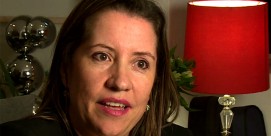Maryland’s Death Penalty
BOB ABERNETHY, anchor: As the U.S. continues to debate the rightness or wrongness of capital punishment, we look at two aspects of the issue. Next week, Huntsville, Texas — where the state prison system carries out more executions than any other in the country. This week: What happened when one state governor declared a moratorium on capital punishment?
Lucky Severson reports:
LUCKY SEVERSON: Decision time, as the state assembly tackles an array of legislation that could alter or ultimately abolish the death penalty in Maryland.
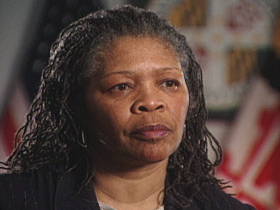
Del. SALIMA SILER MARRIOTT (D-Baltimore, at hearing): H.B. 16 prohibits the execution of any individual.
SEVERSON: House Bill 16 is getting most of the attention. It would reinstate a moratorium on the death sentence that was imposed by Maryland’s former governor, then lifted by the newly elected Republican governor, Robert Ehrlich. So now Maryland has become a central battleground for the increasingly angry debate over capital punishment.
It was in May 2002 when then Governor Parris Glendening stopped all executions in Maryland. That was after a very comprehensive study found that prosecutors are far more likely to seek the death penalty if you are black and your victim is white.
Del. MARRIOTT: It is not likely that, had I been the victim in any of these current cases, would the person be on death row.
SEVERSON (to Del. Marriott): Because you are a black woman?
Del. MARRIOTT: Because I am a black woman.
SEVERSON: Delegate Salima Siler Marriott is not very popular with death penalty advocates, who refer to her as “criminal friendly.” She’s a sponsor of the bill that would extend the moratorium.
Del. MARRIOTT: We know that in Maryland there are disparities in the system. We also know in Maryland that many individuals have also been exonerated. Or their sentence has been commuted because there have been some flaws. So I strongly believe under this present system of flaws no one should be executed.
KAY CROSS (Parent of Murder Victim): Is the death penalty handed out fairly in Maryland? No, and how inconsiderate of Joey to be murdered allegedly by a black man.
SEVERSON: If the man charged of murdering Kay Cross’s son is convicted, she wants him to pay the ultimate price.
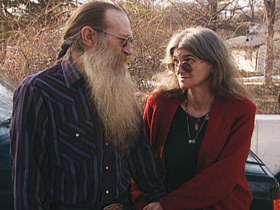
Ms. CROSS (at hearing): This is my baby Joey. He was 21 years old when his home was broken into and he was murdered. Flat out and in cold blood. Every vital organ in his body was destroyed, with a final shot to the back of his head.
SEVERSON: Kay Cross and her companion of 20 years, Don Moats, are fed up with the appeals process afforded the accused murderer. For them, the death penalty is justice, pure and simple.
Ms. CROSS: We have to fight tooth and nail to try and get justice done when that should be readily available to us. You know, that is what we are entitled to — justice.
Del. MARRIOTT: What is important to them in my opinion is a decision in my opinion only God can make and not the state. And for me as a representative of this state, it is extraordinarily offensive.
VICKI SCHIEBER (Parent of Murder Victim): I don’t think I ever learned what sanctity of human life means as I learned from this experience.
SEVERSON: Vicki Schieber’s daughter Shannon had graduated from Duke, was working on her master’s degree — a wonderful life ahead. And then in the middle of the night…
Ms. SCHIEBER: She had been raped. There was a terrible fight. She had bitten him quite a bit. There was blood all over the bedspread and on the wall and the drapes.
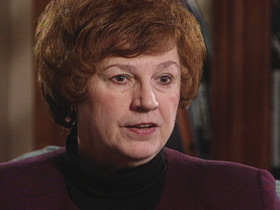
SEVERSON: The murderer was found and convicted. Because of the DNA evidence, there was no question.
Ms. SCHIEBER: You are in terrible shock. Then there is anger. Yes, there is anger. Yes — “Why would you do this?” There is such anger.
SEVERSON: But the anger, and the empty place in their lives, didn’t change the Schiebers’ view on capital punishment.
(to Ms. Schieber): You are opposed to the death penalty?
Ms. SCHIEBER: If you have principles, that is the time those principles are tried. If you lose them then you never had them in the first place, did you?
SEVERSON: Vicki and her husband have testified for Maryland’s moratorium bill. She is grateful her daughter’s killer got life without parole instead of death. She wants to meet him.
Ms. SCHIEBER: I think it will help me heal. It hasn’t been easy. It has been very hard, but I think it will be good. We will find some good.
FRED ROMANO (President, Maryland Coalition for State Executions, at hearing): When you commit a murder you should be held accountable with your life.
SEVERSON: Fred Romano is president of the Maryland Coalition for State Executions. He founded it. It’s his mission in life, to speak out for what he calls the “silent voice.” And he is tired of bleeding hearts, as he sees them, who are more concerned about the killer than the victim’s family.
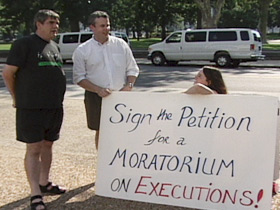
Mr. ROMANO: Don’t come to me when you have never faced it and tell me how I should feel — because I feel the way I feel. When you murder someone in cold blood you need to die.
(testifying): It seems like the victim’s face is lost in the shuffle.
SEVERSON: Fred Romano testified in favor of a bill called Dawn’s Law. It is named after his sister, who was raped and then sadistically murdered in 1987.
Mr. ROMANO: He took a gun and put it to her head and shot her twice in the head. And that’s what happened. And then went to the refrigerator and drank a beer when it was done.
SEVERSON: Dawn’s Law requires the state to seek the death penalty for any murder, with one exception — unless the victim’s family is against it. It’s similar to a law in Pennsylvania, where Vicki Schieber’s daughter was killed. Only the Schiebers, much to the chagrin of the prosecutor, said they opposed capital punishment.
The district attorney in Philadelphia came out and said that would put the Schiebers in the anomalous position of having to spare the life of the person who put their own daughter to death.
(to Ms. Schieber): You have no second thoughts?
Ms. SCHIEBER: No second thoughts. I have never regretted it for a moment.
SEVERSON: It’s not only for religious reasons that Vicki is against the death penalty. Several studies have shown evidence of racial bias, incompetent or lazy public defenders, disparities in how the death penalty is applied in different jurisdictions. And a study by Columbia University found that the state of Maryland has a particularly high rate of errors in cases where the death penalty might have been imposed.
UNIDENTIFIED JUDGE (at hearing): If Maryland proceeds with executions, it is inevitable that some innocent persons will be executed.
SEVERSON: Since 1976, at least 127 inmates on death row have been exonerated because [of] among other things, recanted or tainted testimony or because of DNA evidence, as was the case with Kirk Bloodsworth. He had intended to spend his life as a waterman on the Chesapeake Bay in Maryland. Instead, he spent eight years in prison, two on death row, for the rape and murder of a nine-year-old girl, until a DNA test cleared him.
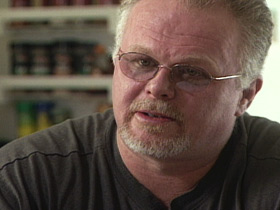
KIRK BLOODSWORTH (Former Death Row Inmate): My life was a living hell every day. The innocent part you talked about was what got me through every day. I knew I didn’t belong here.
SEVERSON: He says his first day out of jail was the happiest of his life. But then reality set in. It’s been difficult finding and keeping a job. The accusations against him didn’t stop.
Mr. BLOODSWORTH: I worked at a tool company, and people used to write “child killer” on the side of my truck. A lot of people don’t understand what DNA is, they just believe it is some sort of technical jump to get out of prison, like a loophole — when, in fact, it is a white knight to me.
SEVERSON: Kirk has asked the Maryland legislature to abolish the death penalty — instead, to use Maryland’s “life without parole law.” Fred Romano, like most Americans, it seems, disagrees.
Mr. ROMANO: Life in prison to me does not mean death in prison. Because you’ve got some person like Delegate Marriott who is going to try and change the laws, and the next thing you know all those guys who were serving life in prison with no parole are going to be eligible for parole. And they all are going to be walking the street and killing again.
SEVERSON: In the end, the moratorium legislation was defeated, and the state’s capital punishment law is back in place. For Fred Romano and Kay Cross, justice may now be done. Vicky Schieber and Kirk Bloodsworth worry that innocent men and women may die in the name of justice.
For RELIGION & ETHICS NEWSWEEKLY, I’m Lucky Severson in Annapolis, Maryland.
ABERNETHY: Illinois is now the only state that has a moratorium on capital punishment.



